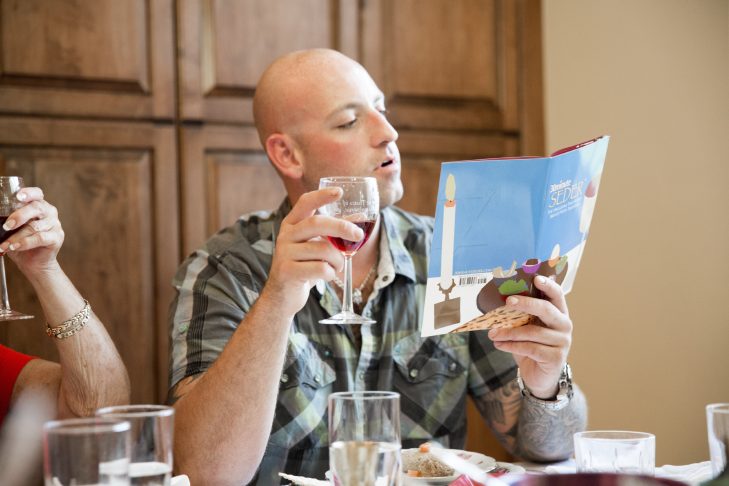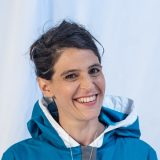The year is progressing forward, and my favorite holidays are approaching. Purim and then Passover. Very soon I will begin the fellowship workshops, which I prepare for and get excited about just like I do before the holidays.
A while ago I closed my eyes and tried to sense the feeling of Passover. Beyond the history and the reason why we celebrate, there is the atmosphere of every holiday. The family story and personal story, the sensational story—the emotional charge.
When I close my eyes and think about Passover, I can smell the matzoh ball soup, the cooking. I remember the excitement of the new clothes my mother bought me. I remember us all cleaning the house for weeks before the Passover seder, and how I couldn’t wait for us to finish with it. I remember how excited I got when my father would purposely hide pieces of bread throughout the house, and my older brother and I would search for the pieces of bread he hid. Then we would go out to burn the chametz we found in the house. It puts a huge smile on my face when I remember the sign language my family made up for the song “Echad Mi Yodea.”
These preparations for the holiday often remind me of show rehearsals. When I am in the process of a new creation, I first of all choose a general theme. Usually, it is a theme that I am concerned with at the time. Before I think about the values I want to convey, before I read theoretical content on the subject, I try to connect to the theme from an emotional place, to my senses, to my memories.
Usually, two days before the show when everything is pretty much ready, and the only thing left is my excitement, I stop rehearsing. I get impatient. There’s a point where I feel: enough, this show needs an audience. And I remember that feeling as a child, before the Passover seder. That’s it, I was out of patience. I just wanted the guests to arrive, to wear the new dress, and to begin the seder (and the great suspense: Who? Who would find the afikomen? Maybe this time it would be me?)
When you think about it, Jewish ceremonies, or the Passover seder for instance, are, in all senses, theatrical events. For Passover, we have a Haggadah, that is, a play. In this wonderful play there is a story, and the invited guests have to tell it. We sit in a certain way (each family chooses their own artistic style), there are stage directions that tell you when to eat and what to eat, when and how to drink and in what ways to tell the story. There are families who actually embody Elijah the prophet entering their home. And like a theatrical performative action—which aims to take the audience through a small journey so they come out slightly different than they were going in—such is the Passover seder. Even though we tell the same story every year, I always remember us reaching the end of the seder with a sense of catharsis. We always go through some emotional process over the course of the Passover seder. There is a reason why everyone sings “next year in Jerusalem” at the end of the play.
A few weeks ago, I had a meeting with my mentor Tova Speter for the fellowship, and Tova spoke about the difference between memory and history. Memory is really something beyond the historical event. While we talked about it, a strong memory came to mind of the Passover seder I had a decade ago:
Ten years ago, a week before the Passover seder, my grandmother was hospitalized. Everything was very dramatic. My family and I were so focused on my grandmother’s health that we weren’t at all involved in the Passover seder. At the last minute, family friends invited us to their seder and we decided to go. I remember being in the hospital until very late and arriving late to the seder. I remember myself walking on our friends’ street, and hearing the Passover seder in almost every house. From a lot of houses, I heard families singing the same song in the Haggadah. As if they all timed it together. At first, I ran, because I was in a hurry, but very soon I slowed down to listen to the sound of the families. Of the holiday. Of the dishes, the songs, the children, the laughter. It was a very powerful experience. Because it both instantly got me into the holiday spirit, and because there was a touching sense of community in it. For one evening, we are all having the same ceremony. We are all in the same play.
The memory of that Passover seder has a strong emotional charge. An emotional charge that motivates me to hold the Passover seder each year. Beyond the historical story, there is also everything we create around it, the essence of the story, the sense of belonging.
Which brings me back to the creative process and the search for sensation and emotion.
Both in my artistic work and my work as a medical clown, and simply in life itself, I remind myself again and again that sometimes you can’t change reality, but you can change the way you look at it. We always choose a point of view, and that point of view is related to how we tell our story. I would like to hear people’s stories. I wonder how the participants see their home, where they see themselves in relation to it. Do you have stories related to your sense of belonging? How can memories be theatrically written so that we can tell them in the form of storytelling? I want the story to transform from a historical story into a memory. An emotional story with perspective. Because our memories and experiences in life really are what shape us, the way we choose to tell our story is the way we will remember a certain event and ourselves.
This post has been contributed by a third party. The opinions, facts and any media content are presented solely by the author, and JewishBoston assumes no responsibility for them. Want to add your voice to the conversation? Publish your own post here. MORE



